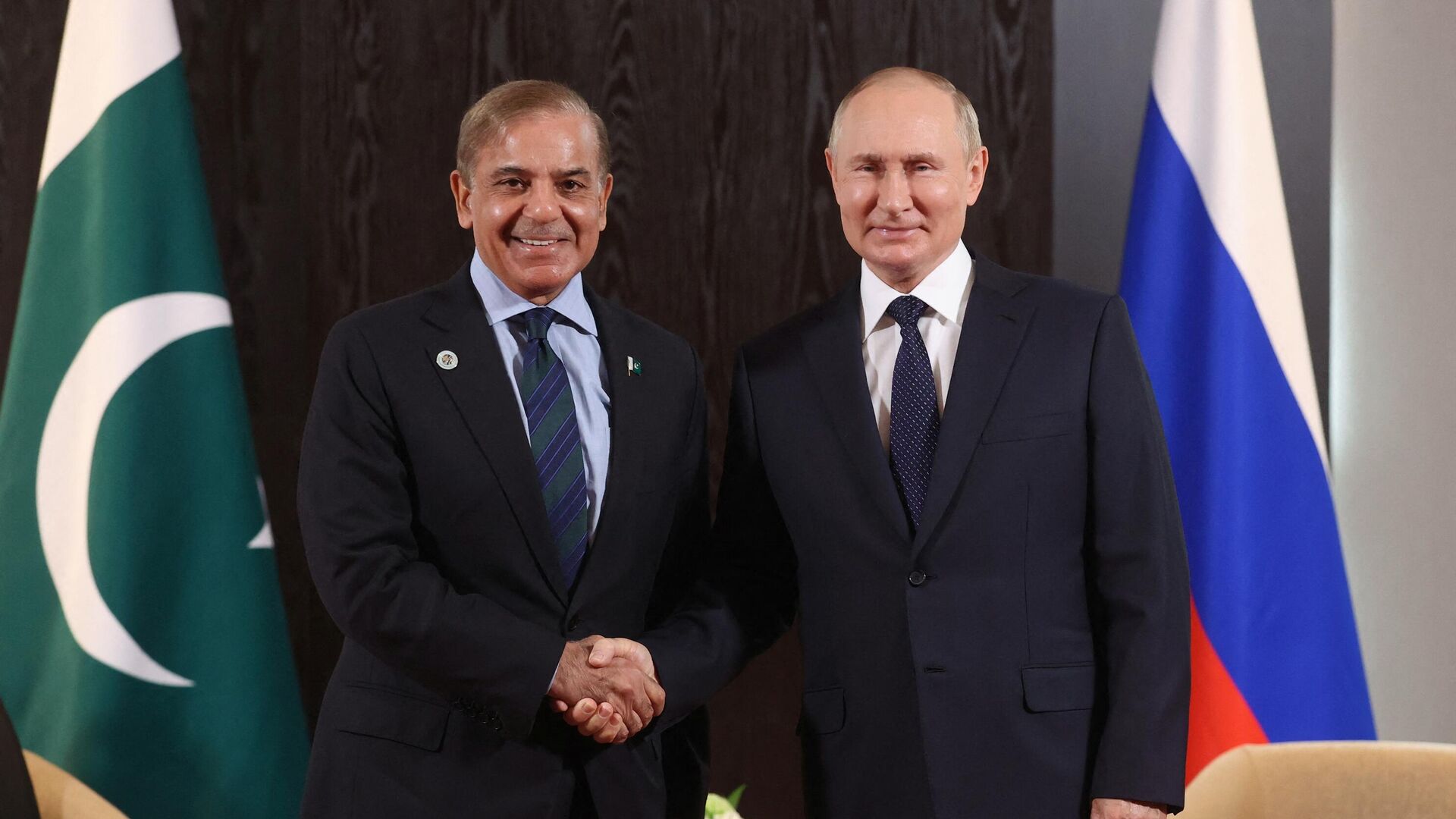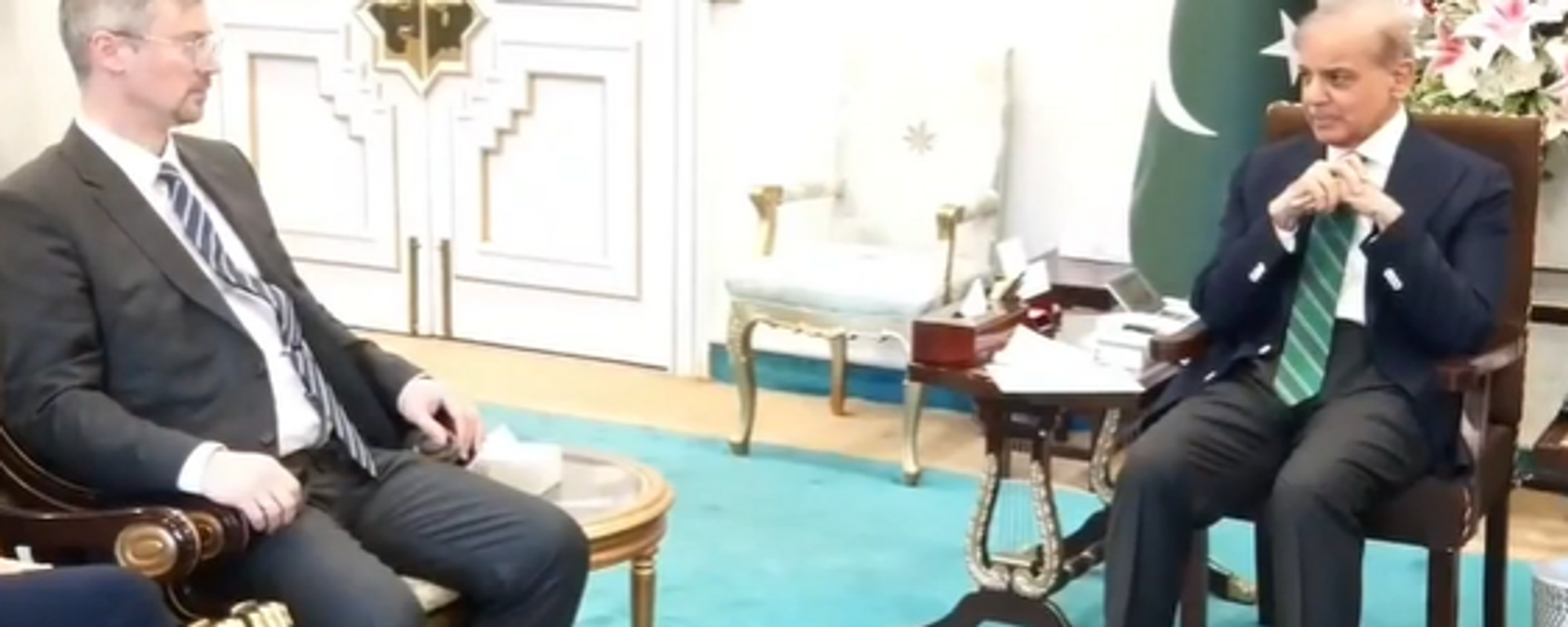https://sputniknews.in/20240525/navigating-global-south-where-does-pakistan-russia-relationship-stand-7449819.html
Navigating Global South: Where Does Pakistan-Russia Relationship Stand?
Navigating Global South: Where Does Pakistan-Russia Relationship Stand?
Sputnik India
In the ever-changing global and regional landscape, the relationship between Islamabad and Moscow has shifted towards a more nuanced and constructive approach.
2024-05-25T15:45+0530
2024-05-25T15:45+0530
2024-05-25T18:36+0530
sputnik opinion
sergey lavrov
pakistan
russia
islamabad
shanghai cooperation organisation (sco)
the united nations (un)
nato
https://cdn1.img.sputniknews.in/img/07e8/05/19/7452307_0:0:2969:1671_1920x0_80_0_0_d68ae262a37a6291bacfe54161919625.jpg
Russia and Pakistan seem to be leaning towards developing a bilateral strategic partnership in the shaping multipolar world, as the latter's close ties with Western countries during the Cold War made Islamabad a major debtor to the International Monetary Fund.Last week, newly chaired Pakistani Deputy Prime Minister and Foreign Minister Mohammad Ishaq Dar and his Russian counterpart, Foreign Minister Sergey Lavrov, discussed mutual understanding, economic cooperation, collaboration between the two states, and recent regional and global occurrences at the session of the Shanghai Cooperation Organisation (SCO) Council of Foreign Ministers (CFM) in Kazakhstan.Similarly, Albert Khorev, Russia's ambassador to Pakistan, previously discussed Russia's strategy for settling the Afghan conflict and the two nations' potential for participation in the SCO, export-import cycle, and the Eurasian Economic Union (EAEU).Pakistan has also applied to join the BRICS Plus group, and is leaning towards it. However, establishing a solid partnership between Russia and Pakistan is complicated by including India, a significant regional adversary for Islamabad but an excellent regional partner for Russia, in the organisation. Similarly, Pakistan's previous collaboration with the United States during the Afghanistan War and other regional matters has further complicated the diplomatic situation.After the US and NATO's departure from Afghanistan, a vacuum was created for new friendships, regional connectivity, and partnerships. In this regard, former UK PM Lord Palmerston nicely says, “There are no permanent friends or enemies in the global arena”.Area of Convergence: From Cold War Hostility to Economic CooperationConcerning this, Sputnik interviewed Muhammad Taimur Fahad Khan, an expert on the Pakistan-Russia relationship, geopolitical analyst, and think tanker associated with the Institute of Strategic Studies in Islamabad. “The relationship has been further strengthened by shared interests in regional stability, counterterrorism, and balancing external influences in South Asia. Additionally, Pakistan and Russia cooperate in various multilateral forums, such as the UN and the Shanghai Cooperation Organisation, enhancing their strategic alignment and collaborative efforts on global and regional issues. Recent high-level visits and diplomatic engagements underscore the mutual commitment to deepening this partnership”, the pundit expressed.Despite these obstacles, new partnerships and diplomatic links are now possible due to shifting regional and global dynamics. Russia and Pakistan are keen to take advantage of this chance and deepen their bilateral relationship.Area of DivergenceNevertheless, Islamabad's alliance with Washington during the Cold War era has come at a heavy cost – thousands of lives, infrastructure damage, and strained regional relations. Increased terrorist threats in the country, weaponisation, and violence have taken a toll. This landscape is evolving as Pakistan seeks to pivot from geo-strategic to geo-economic partnerships.Russia and China are emerging as promising alternatives, with their foreign policies centred on geo-economic cooperation and mutual interests. Pakistan's existing relationship with China provides a solid foundation, although further improvements are needed.The irony is that the bottleneck in Pakistan's foreign policy is the presence of three contradicting schools of thought: pro-Western, pro-Sino-Russian, and pro-independent foreign policy. This political polarisation, coupled with civil-military rifts, religious tensions, and conflicts with neighbouring states, has created a significant challenge for Pakistan in formulating an independent and stable foreign policy.
https://sputniknews.in/20240330/pakistan-seeks-to-enhance-cooperation-with-russia-in-energy-trade-investment-6991725.html
pakistan
russia
islamabad
Sputnik India
feedback.hindi@sputniknews.com
+74956456601
MIA „Rossiya Segodnya“
2024
Muhammad Sharif
https://cdn1.img.sputniknews.in/img/07e7/0b/05/5257054_0:0:443:444_100x100_80_0_0_b8bd2af32be62a6eecdb4a84c7fd978f.jpg
Muhammad Sharif
https://cdn1.img.sputniknews.in/img/07e7/0b/05/5257054_0:0:443:444_100x100_80_0_0_b8bd2af32be62a6eecdb4a84c7fd978f.jpg
News
en_IN
Sputnik India
feedback.hindi@sputniknews.com
+74956456601
MIA „Rossiya Segodnya“
Sputnik India
feedback.hindi@sputniknews.com
+74956456601
MIA „Rossiya Segodnya“
Muhammad Sharif
https://cdn1.img.sputniknews.in/img/07e7/0b/05/5257054_0:0:443:444_100x100_80_0_0_b8bd2af32be62a6eecdb4a84c7fd978f.jpg
global south, pakistan, russia, relationship
global south, pakistan, russia, relationship
Navigating Global South: Where Does Pakistan-Russia Relationship Stand?
15:45 25.05.2024 (Updated: 18:36 25.05.2024) In the ever-changing global and regional landscape, the relationship between Pakistan and Russia has shifted towards a more nuanced and constructive approach.
Russia and Pakistan seem to be leaning towards developing a bilateral strategic partnership in the shaping multipolar world, as the latter's close ties with Western countries during the Cold War made Islamabad a major debtor to the International Monetary Fund.
Last week, newly chaired Pakistani Deputy Prime Minister and Foreign Minister Mohammad Ishaq Dar and his Russian counterpart, Foreign Minister Sergey Lavrov, discussed mutual understanding, economic cooperation, collaboration between the two states, and recent regional and global occurrences at the session of the Shanghai Cooperation Organisation (SCO) Council of Foreign Ministers (CFM) in Kazakhstan.
Similarly, Albert Khorev, Russia's ambassador to Pakistan, previously discussed Russia's strategy for settling the Afghan conflict and the two nations' potential for participation in the SCO, export-import cycle, and the Eurasian Economic Union (EAEU).
Pakistan has also applied to join the BRICS Plus group, and is leaning towards it. However, establishing a solid partnership between Russia and Pakistan is complicated by including India, a significant regional adversary for Islamabad but an excellent regional partner for Russia, in the organisation. Similarly, Pakistan's previous collaboration with the United States during the Afghanistan War and other regional matters has further complicated the diplomatic situation.
After the US and NATO's departure from Afghanistan, a vacuum was created for new friendships, regional connectivity, and partnerships. In this regard, former UK PM Lord Palmerston nicely says, “There are no permanent friends or enemies in the global arena”.
The quote concisely illustrates the notion that alliances and partnerships can be malleable and susceptible to alteration due to evolving national interests rather than rigid or enduring in politics and diplomacy.
Area of Convergence: From Cold War Hostility to Economic Cooperation
Concerning this, Sputnik interviewed Muhammad Taimur Fahad Khan, an expert on the Pakistan-Russia relationship, geopolitical analyst, and think tanker associated with the Institute of Strategic Studies in Islamabad.
“The Pakistan-Russia relationship has seen significant improvement in recent years, evolving from Cold War-era hostility to strategic cooperation. This evolution is marked by increased military collaboration, including joint exercises and defence agreements, and growing economic ties, particularly in energy and infrastructure projects. In 2023, the bilateral trade volume reached the benchmark of $1 billion, reflecting the growing economic engagement,” he said.
“The relationship has been further strengthened by shared interests in regional stability, counterterrorism, and balancing external influences in South Asia. Additionally, Pakistan and Russia cooperate in various multilateral forums, such as the UN and the Shanghai Cooperation Organisation, enhancing their strategic alignment and collaborative efforts on global and regional issues. Recent high-level visits and diplomatic engagements underscore the mutual commitment to deepening this partnership”, the pundit expressed.
Despite these obstacles, new partnerships and diplomatic links are now possible due to shifting regional and global dynamics.
Russia and Pakistan are keen to take advantage of this chance and deepen their bilateral relationship.
"The prospects for the Pakistan-Russia relationship are promising, with potential for enhanced cooperation in energy, defence, and trade. To strengthen and diversify this partnership, Pakistan should increase bilateral trade and investment, explore joint ventures in key sectors like energy and infrastructure, and expand defence cooperation through joint exercises and training programmes", Muhammad Taimur Fahad Khan further said.
Nevertheless, Islamabad's alliance with Washington during the Cold War era has come at a heavy cost – thousands of lives, infrastructure damage, and strained regional relations. Increased terrorist threats in the country, weaponisation, and violence have taken a toll. This landscape is evolving as Pakistan seeks to pivot from geo-strategic to geo-economic partnerships.
"Regular high-level visits and diplomatic dialogues are essential for addressing mutual concerns and enhancing political understanding. Active collaboration in multilateral forums... will align their positions on regional and global issues. Additionally, fostering people-to-people connections through cultural exchanges, educational programmes, and tourism initiatives will further solidify the strategic partnership, contributing to regional stability and economic growth", Khan underscored.
Russia and China are emerging as promising alternatives, with their foreign policies centred on geo-economic cooperation and mutual interests. Pakistan's existing relationship with China provides a solid foundation, although further improvements are needed.
The irony is that the bottleneck in Pakistan's foreign policy is the presence of three contradicting schools of thought: pro-Western, pro-Sino-Russian, and pro-independent foreign policy. This political polarisation, coupled with civil-military rifts, religious tensions, and conflicts with neighbouring states, has created a significant challenge for Pakistan in formulating an independent and stable foreign policy.



